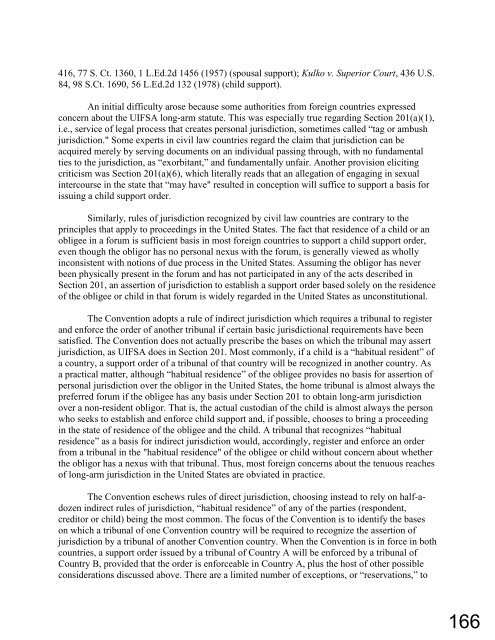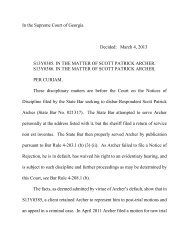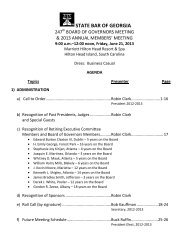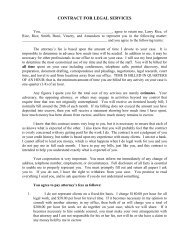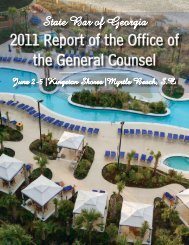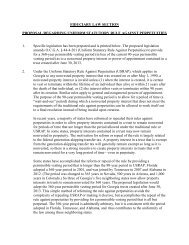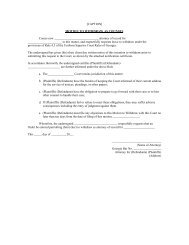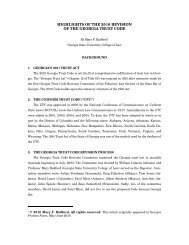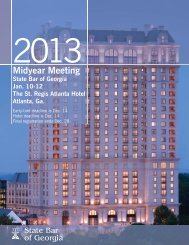2008 Amendments to the Uniform Interstate Family Support Act ...
2008 Amendments to the Uniform Interstate Family Support Act ...
2008 Amendments to the Uniform Interstate Family Support Act ...
Create successful ePaper yourself
Turn your PDF publications into a flip-book with our unique Google optimized e-Paper software.
416, 77 S. Ct. 1360, 1 L.Ed.2d 1456 (1957) (spousal support); Kulko v. Superior Court, 436 U.S.<br />
84, 98 S.Ct. 1690, 56 L.Ed.2d 132 (1978) (child support).<br />
An initial difficulty arose because some authorities from foreign countries expressed<br />
concern about <strong>the</strong> UIFSA long-arm statute. This was especially true regarding Section 201(a)(1),<br />
i.e., service of legal process that creates personal jurisdiction, sometimes called “tag or ambush<br />
jurisdiction." Some experts in civil law countries regard <strong>the</strong> claim that jurisdiction can be<br />
acquired merely by serving documents on an individual passing through, with no fundamental<br />
ties <strong>to</strong> <strong>the</strong> jurisdiction, as “exorbitant,” and fundamentally unfair. Ano<strong>the</strong>r provision eliciting<br />
criticism was Section 201(a)(6), which literally reads that an allegation of engaging in sexual<br />
intercourse in <strong>the</strong> state that “may have" resulted in conception will suffice <strong>to</strong> support a basis for<br />
issuing a child support order.<br />
Similarly, rules of jurisdiction recognized by civil law countries are contrary <strong>to</strong> <strong>the</strong><br />
principles that apply <strong>to</strong> proceedings in <strong>the</strong> United States. The fact that residence of a child or an<br />
obligee in a forum is sufficient basis in most foreign countries <strong>to</strong> support a child support order,<br />
even though <strong>the</strong> obligor has no personal nexus with <strong>the</strong> forum, is generally viewed as wholly<br />
inconsistent with notions of due process in <strong>the</strong> United States. Assuming <strong>the</strong> obligor has never<br />
been physically present in <strong>the</strong> forum and has not participated in any of <strong>the</strong> acts described in<br />
Section 201, an assertion of jurisdiction <strong>to</strong> establish a support order based solely on <strong>the</strong> residence<br />
of <strong>the</strong> obligee or child in that forum is widely regarded in <strong>the</strong> United States as unconstitutional.<br />
The Convention adopts a rule of indirect jurisdiction which requires a tribunal <strong>to</strong> register<br />
and enforce <strong>the</strong> order of ano<strong>the</strong>r tribunal if certain basic jurisdictional requirements have been<br />
satisfied. The Convention does not actually prescribe <strong>the</strong> bases on which <strong>the</strong> tribunal may assert<br />
jurisdiction, as UIFSA does in Section 201. Most commonly, if a child is a “habitual resident” of<br />
a country, a support order of a tribunal of that country will be recognized in ano<strong>the</strong>r country. As<br />
a practical matter, although “habitual residence” of <strong>the</strong> obligee provides no basis for assertion of<br />
personal jurisdiction over <strong>the</strong> obligor in <strong>the</strong> United States, <strong>the</strong> home tribunal is almost always <strong>the</strong><br />
preferred forum if <strong>the</strong> obligee has any basis under Section 201 <strong>to</strong> obtain long-arm jurisdiction<br />
over a non-resident obligor. That is, <strong>the</strong> actual cus<strong>to</strong>dian of <strong>the</strong> child is almost always <strong>the</strong> person<br />
who seeks <strong>to</strong> establish and enforce child support and, if possible, chooses <strong>to</strong> bring a proceeding<br />
in <strong>the</strong> state of residence of <strong>the</strong> obligee and <strong>the</strong> child. A tribunal that recognizes “habitual<br />
residence” as a basis for indirect jurisdiction would, accordingly, register and enforce an order<br />
from a tribunal in <strong>the</strong> "habitual residence" of <strong>the</strong> obligee or child without concern about whe<strong>the</strong>r<br />
<strong>the</strong> obligor has a nexus with that tribunal. Thus, most foreign concerns about <strong>the</strong> tenuous reaches<br />
of long-arm jurisdiction in <strong>the</strong> United States are obviated in practice.<br />
The Convention eschews rules of direct jurisdiction, choosing instead <strong>to</strong> rely on half-adozen<br />
indirect rules of jurisdiction, “habitual residence” of any of <strong>the</strong> parties (respondent,<br />
credi<strong>to</strong>r or child) being <strong>the</strong> most common. The focus of <strong>the</strong> Convention is <strong>to</strong> identify <strong>the</strong> bases<br />
on which a tribunal of one Convention country will be required <strong>to</strong> recognize <strong>the</strong> assertion of<br />
jurisdiction by a tribunal of ano<strong>the</strong>r Convention country. When <strong>the</strong> Convention is in force in both<br />
countries, a support order issued by a tribunal of Country A will be enforced by a tribunal of<br />
Country B, provided that <strong>the</strong> order is enforceable in Country A, plus <strong>the</strong> host of o<strong>the</strong>r possible<br />
considerations discussed above. There are a limited number of exceptions, or “reservations,” <strong>to</strong><br />
166


